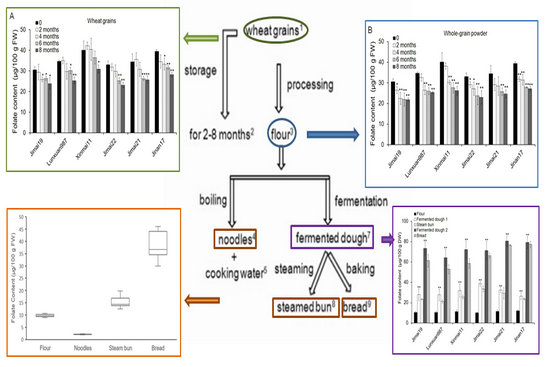Recently, crop metabolism regulation and nutrition biofortification team from Biotechnology research institute did a systematic analysis of folate content and folate retention in wheat grains and wheat-based foods during storage, processing and cooking, which will help to guide industrial/household preparation of wheat-based foods for folate nutrition. The related results published on Food chemistry.
Folates, which belong to water-soluble vitamin B (B9), are essential micronutrients for human health. Humans are unable to produce folates and must depend on dietary consumption. Wheat is one of the three staple foods worldwide, and wheat-based foods are commonly consumed in daily life, especially in North China. In the previous work, to investigate the natural variation of folates among wheat cultivars and identify high folate materials as direct diet or for breeding, the research team of Chunyi Zhang and Xingguo Ye studied the grain folate contents of 360 wheat samples cooperately, and fifty-two wheat cultivars were identified as good sources of folates. Although folates are essential, they are labile compounds such that a variety of factors, including UV light, heating, air, and unfavourable pH levels, can lead to their inter-conversion or degradation. These factors may occur during food storage, processing, and cooking. Then, the two teams continued their study and did the evaluation of the effects of storage, processing and cooking methods on folate content and identify factors with great influence on folate retention in wheat grains and wheat-based foods. A 14% folate loss was observed in wheat grains after 4-month storage, and it was up to 26% folate loss after eight-month storage. The milling process, with an extraction rate of 70%, led to a severe (71%) folate loss. The folate retention rate in noodles was 78%. Fermentation by yeast production enabled a 1.5–4-fold enhancement of folate levels in steamed bun and bread. Boiling, steaming and baking led to a folate loss of 11-16%. Thus, steamed buns and bread are good sources of folates.
Doctor Qiuju Liang form Biotechnology research institute and associate professor Ke Wang from Crop science institute were as co-first author, and Professor Xingguo Ye from Crop science institute and Chunyi Zhang form Biotechnology research institute as co-correspondence authors. This study was supported by the National Special Program for Transgenic Research, Collaborative Innovation Action, Agricultural Science, and Technology Innovation Program of the Chinese Academy of Agricultural Sciences, and public laboratory of the Biotechnology Research Institute, Chinese Academy of Agricultural Sciences for use of the HPLC and triple-quadrupole MS/MS instrument, and for providing technical assistance.
The research team of prof. Chunyi Zhang has been work on folate metabolic regulation and folate biofortification since last decade, and had made great progress in development of folate determination, crop molecular breeding for folate biofortification, and confirmation of the improvement of foods rich in folates on human health. These works greatly promote the construction of nutrition agriculture.

|